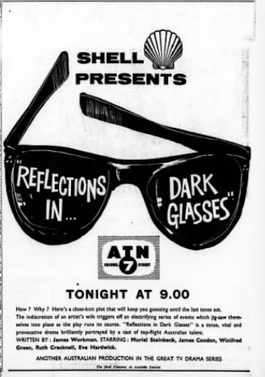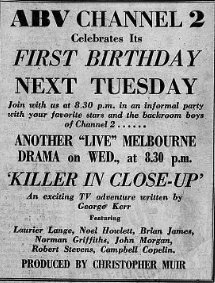Related Research Articles
Autumn Affair is an Australian television series made by and aired by Network Seven station ATN-7, and also shown in Melbourne on Nine Network station GTV-9. Television in Australia had only been broadcasting since 1956 and Seven was the first commercial station to make drama a priority. It premiered 24 October 1958 and continued until 1959. The series was the first ever Australian television soap opera. It was also the second regular Australian-produced dramatic television series of any kind, with previous locally produced drama consisting of religious series The House on the Corner, and one-off plays largely aired on ABC.
Emergency is an Australian television series produced by Nine Network Melbourne station GTV-9 in 1959.

The Adventures of Long John Silver is a TV series about the Long John Silver character from Robert Louis Stevenson's 1883 novel Treasure Island. It was made in 1954 in colour in Australia for the American and British markets before the development of Australian television.

Shell Presents was an early attempt at Australian television drama, being an umbrella title for several different productions. It debuted on 4 April 1959, and aired on ATN-7 and GTV-9, who split production of plays for the series between them. It was an anthology series, each program being a self-contained play for television. The series won a Logie award in 1960 for TV Highlight of 1959. As the title suggests, it was sponsored by Shell. It was described as "a very big deal for the station: major institutional sponsorship from international companies for locally produced drama." It would be followed by The General Motors Hour.

Stormy Petrel is an early Australian television drama. A period drama, the 12-episode serial told the story of William Bligh and aired in 1960 on ABC. It was the first live TV serial from the ABC.
Barley Charlie was an Australian television sitcom which aired in 1964. It was the second television sitcom produced in Australia; being preceded by the 1957-1959 series Take That, although that Crawford Productions sitcom had only aired in Melbourne. Some of the creatives went on to be involved in the serial drama Undercurrent (1965).

"Reflections in Dark Glasses" is an Australian television film, or rather a television play, which aired in 1960. It aired as part of Shell Presents, which consisted of monthly presentations of stand-alone television dramas. It was written by Sydney writer James Workman, and is notable as an early example of Australian-written television drama. It was broadcast live in Sydney on 6 February 1960, then recorded and shown in Melbourne.

"They Were Big, They Were Blue, They Were Beautiful" is an Australian television movie, or rather a live television play, which aired live on 27 June 1959 in Sydney, and on 8 August 1959 in Melbourne. It aired as part of Shell Presents, a monthly presentation of standalone productions which aired from 1959 to 1960 on ATN-7 in Sydney and GTV-9 in Melbourne.

"The Big Day" is an Australian television film, or rather a live television play, which aired in 1959. The fifth episode of the Shell Presents presentations of standalone television dramas, it originally aired 11 July 1959 on Melbourne station GTV-9, a video-tape was made of the broadcast and shown on Sydney station ATN-7 on 25 July 1959.

"No Picnic Tomorrow" is an Australian television drama one-off which aired in 1960 on ATN-7 in Sydney and GTV-9 in Melbourne. Part of the Shell Presents series of one-off television dramas and comedies, it was produced in Melbourne, but first shown in Sydney on 9 January 1960, and on 23 January 1960 Melbourne.

Boy Round the Corner is an Australian film which aired in 1962. Broadcast live on ABC, it was set in Sydney but produced in Melbourne. Australian TV drama was relatively rare at the time.

Killer in Close-Up was a blanket title covering four live television drama plays produced by the Australian Broadcasting Commission in 1957 and 1958. It could be seen as the first anthology series produced for Australian television.
The General Motors Hour was an Australian radio and television drama series.
"Johnny Belinda" was a 1959 Australian TV adaptation of the 1940 play by Elmer Harris which had been filmed in 1948. It was the first "live" one hour drama on commercial television in Australia.

"Pardon Miss Westcott" is a 1959 Australian TV play by the Seven Network as part of drama anthology series Shell Presents. It was a musical set in colonial Australia and was broadcast live. It was Australia's first television musical comedy. "Pardon Miss Westcott" aired on 12 December 1959 in Sydney and on 19 December 1959 in Melbourne.

"Thunder of Silence" is an episode of the 1959 Australian TV drama anthology Shell Presents, and the fourth made in Sydney. It was based on an American play by Stewart Stern which had been produced in the U.S. with Paul Newman and Inger Stevens. It aired live on 22 August 1959 in Sydney with a recorded version airing on 28 November 1959 in Melbourne.

"A Tongue of Silver" is an episode of the 1959 Australian TV drama anthology Shell Presents. Australian TV drama was relatively rare at the time. It starred John Meillon, who had been in Thunder of Silence in the same series.

"Ruth" is a 1959 Australian television play. It was presented as part of the Shell Presents program and starred Lyndall Barbour. It was written by John Glennon, an American actor and writer who appeared in the production, and directed by Rod Kinnear. The play aired in Melbourne on 5 September 1959 and in Sydney on 19 September 1959.
"Shadow of a Pale Horse" is a television play that was produced for Australian TV by Sydney station ATN-7, it was also shown in Melbourne on station GTV-9, as this was prior to the creation of the Seven Network and Nine Network. "Shadow of a Pale Horse" aired on 17 September 1960 in Melbourne and Sydney.
References
- ↑ Vagg, Stephen (29 August 2020). "Annette Andre: My Brilliant Early Australian Career". FilmInk . Archived from the original on 26 October 2020. Retrieved 29 August 2020.
- ↑ "Television Parade". The Australian Women's Weekly . Vol. 24, no. 53. Australia. 5 June 1957. p. 4. Retrieved 2 May 2015– via National Library of Australia.
- ↑ Vagg, Stephen (18 February 2019). "60 Australian TV Plays of the 1950s & '60s". FilmInk . Archived from the original on 15 January 2020. Retrieved 16 January 2020.
- 1 2 3 McPherson, Ailsa (2007). "Dramas and dreams at Epping: early days of ATN-7's drama production". ACH: The Journal of the History of Culture in Australia. Australian Public Intellectual Network (26). Retrieved 16 July 2022– via Gale OneFile.